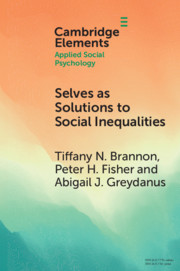2 results

Selves as Solutions to Social Inequalities
- Why Engaging the Full Complexity of Social Identities is Critical to Addressing Disparities
-
- Published online:
- 14 September 2020
- Print publication:
- 08 October 2020
-
- Element
- Export citation
27 - Addressing Underserved Populations and Disparities in Behavior Change
- from Part II - Methods and Processes of Behavior Change: Intervention Development, Application, and Translation
-
-
- Book:
- The Handbook of Behavior Change
- Published online:
- 04 July 2020
- Print publication:
- 23 July 2020, pp 385-400
-
- Chapter
- Export citation

